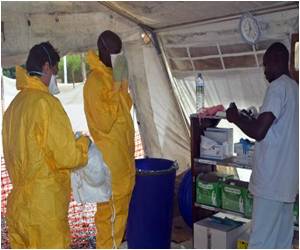
Kaci Hickox, a nurse who flew into New Jersey Friday after caring for the ill in Sierra Leone, one of the hardest hit countries by the epidemic, told CNN, "I feel like my basic human rights have been violated."
She has been isolated in a hospital out of fears she could develop the disease later, given its 21-day incubation period. She said she is being kept outside the main hospital building, with only a hospital bed, a non-flush chemical toilet, and no shower.
In an interview with CNN's State of the Union Sunday, Hickox said she has not been told how long she will have to remain in the hospital.
"When I arrived, I was not symptomatic, and that Friday they tested my blood, and I am negative," she said, which means there is "no way to be contagious."
"And for anyone to tell me that I need to be isolated and be under a quarantine is just completely unacceptable."
Advertisement
The strict new rules in New York, New Jersey and Illinois require a three-week quarantine for anyone exposed to the disease.
Advertisement
Health authorities say the measure could be counterproductive.
"The best way to protect us is to stop (the outbreak) in Africa, and one of the best ways to stop it in Africa is to get health workers who are going there and helping them with their problem," National Institute of Allergy and Infectious Diseases director Anthony Fauci told CNN Sunday.
But "when they come back, they need to be treated in a way that doesn't dis-incentivize them from going there," he said.
Fauci stressed that the scientific evidence "tells us people who are not ill, who don't have symptoms, with whom you don't come into contact with body fluids, they are not a threat, they are not going to spread it."
But New Jersey Governor Chris Christie defended his state's mandatory quarantine, calling it necessary "to protect the public health of the people of New Jersey."
Speaking on Fox News Sunday, Christie said: "I think this is a policy that will become a national policy sooner rather than later."
He rejected arguments it would discourage health workers from traveling to the most impacted zone, saying "I believe that folks who want to take that step, willing to volunteer, also understand it's in their interests and the public health interests to have a 21-day" quarantine.
New York, New Jersey and Illinois ordered the mandatory measure on Friday.
- 'Haphazard and not well thought out' -
US envoy to the United Nations Samantha Power has also expressed concern the new quarantine policies were "haphazard and not well thought out."
"We cannot take measures here that are going to impact our ability to flood the zone" with health workers, Power said Sunday during a stop in Guinea.
Fauci said Sunday, on ABC This Week: "As a scientist and as a health person, if I were asked, I would not have recommended" the quarantine.
He emphasized it is possible to monitor at-risk people by having "somebody taking your temperature, asking you if you have symptoms."
"There's a big, big difference between completely confining somebody that they can't even get outside and doing the appropriate monitoring based on scientific evidence," he said on CNN.
So far there have been nine cases of Ebola in the United States, most among health workers who volunteered in Africa, with only one death.
In the most recent case, the first in New York, doctor Craig Spencer, 33, tested positive a week after returning from Guinea.
Although he was monitoring for symptoms, he spent the days prior to falling ill moving around the city, including riding the subway and going bowling the night before he developed a fever, raising public fears he could have infected others.
But health authorities have said the risk is extremely low.
Ebola is spread though close contact with the sweat, vomit, blood or other bodily fluids of an infected person.
Source-AFP










